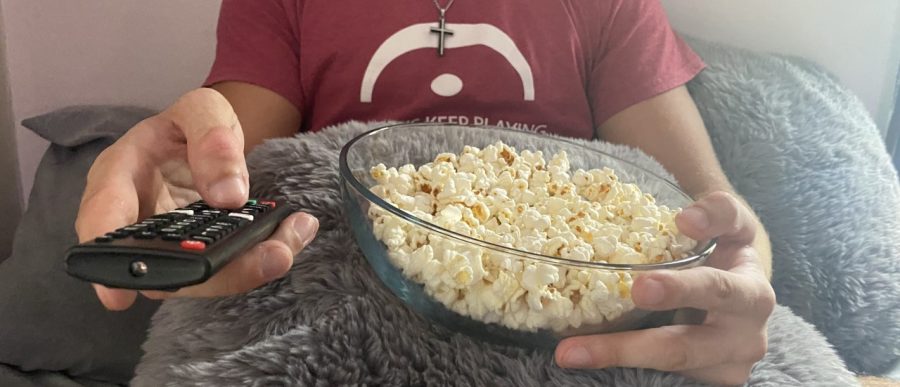Nostalgia: the new self care?
Photo creds: Kelly Hueckman / The Advance-Titan — Opting for a familiar movie instead of a new one can have emotional and psychological benefits.
September 21, 2022
“Oh no, she’s watching “Titanic” again,” my roommate said about me to her boyfriend. “That means she’s sad.”
I tried to defend myself for starting the cult classic for the umpteenth time since we’ve moved in, but she was right: It was solace that I was seeking in the familiar, heart-wrenching tale.
As a matter of fact, I often found myself scrolling through my “recently watched” list after a particularly stressful week. Was I just obsessed?
As it turns out, I’m not alone: Research has shown that rewatching movies and shows can help relieve feelings of anxiety or depression.
This has shown to be especially true during transition phases in one’s life, such as starting a new job, moving to a new city or going to a new school.
In the same fashion as the smell of Grandma’s homemade cookies or flipping through an old photo album, streaming The Office for the third time can provide feelings of comfort.
One reason this effect may take place is the feeling of control familiar movies or shows give us.
While, in theory, it may sound boring and repetitive to watch a movie after already knowing each plot twist and turn, research has shown that knowing the outcome can combat feelings of being powerless with low effort.
Because we already know Darth Vader is Luke’s father, detention cultivates the best friendships and Rose does, in fact, let go of Jack, the suspense of not knowing won’t increase our stress and anxiety levels.
Additionally, the nostalgia that pairs with rewatching your favorite movies has other psychological benefits.
Nostalgia, while once believed to be a disease, can actually improve self-esteem and alleviate feelings of loneliness.
With this in mind, it’s no wonder that college-aged students are constantly reaching for nostalgia—and not just in movies.
This effect could explain why we are constantly reaching for an old favorite book, playlists filled with the soundtrack of our childhood and our go-to Subway order (I know it’s been the same for years).
We subconsciously do this daily, but we can take advantage of the effect even more by adding nostalgia into our self-care routines.
When feelings of anxiety, stress or sadness are starting to weigh down on you, alleviating this weight can be as simple as looking to the past.
Again, this can be in the form of old favorite movies, shows and music, but can also include messaging a hometown friend, going through old voicemails or even cooking your favorite childhood meal. Mac and cheese and chicken nuggets, anyone?
Of course, turning to nostalgia isn’t a magical cure-all solution, and it won’t take away prolonged anxiety and severe depression.
Additionally, it can be counterproductive to introduce too much nostalgia into your routine to the point it takes away from present-day quality of life.
Old memories and the feelings attached to them shouldn’t be used for extreme levels of escapism, but rather a tool to re-balance your mental state after a difficult week.
So, the next time you opt for your favorite comfort movie, don’t worry: It’s not an obsession, it’s self-care.














